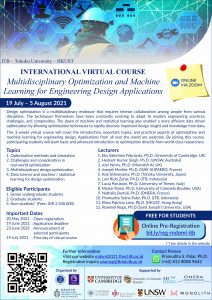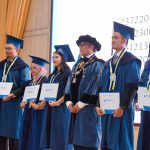Multidisciplinary Optimization and Machine Learning for Engineering Design International virtual Course
19 July 2021 – 5 august 2021
We cordially invite you to participate in our international virtual course:
“International Virtual Course on Multidisciplinary Optimization and Machine Learning for Engineering Design” (MDOML-2021)
Date: 19 July – 5 August 2021
Webpage: https://mdoml2021.ftmd.itb.ac.id
Pre-registration link: bit.ly/reg-mdoml-itb

Background
There is an increasing demand for engineers to improve the design of engineering products to stay competitive with competitors, especially in the current era of high-performance computing and abundant data. Engineers then resort to optimization techniques to help them find high-performance solutions and uncover salient design insight and features. Optimization techniques have been constantly evolving to adapt to modern engineering practices, challenges and complexities. Especially in this age of data, mastery of optimization for engineering design has never been more important than before. The dawn of machine learning has also enabled a more efficient data-driven optimization by aiding optimization techniques to rapidly discover insight and knowledge from data. The intertwine between computer simulations, experimental data, and data-driven methods is now one of the building blocks of modern engineering. Fluency in optimization and machine learning is then becoming an important skill that must be possessed by students, practitioners, and researchers in design optimization to take advantage of the abundant amount of data.
Lecturers
– Eky Valentian Febrianto, Ph.D. (University of Cambridge, UK)
– Hemant Kumar Singh, Ph.D. (University of New South Wales, Australia)
– Joel Henry, Ph.D. (Monolith AI, UK)
– Joseph Morlier, Ph.D. (ISAE-SUPAERO, France)
– Koji Shimoyama, Ph.D. (Tohoku University, Japan)
– Lavi Rizki Zuhal, Ph.D. (Institut Teknologi Bandung, Indonesia)
– Lucia Parussini, Ph.D. (University of Trieste, Italy)
– Maziar Raissi, Ph.D. (University of Colorado Boulder, USA)
– Nathalia Bartoli, Ph.D. (ONERA – The French Aerospace Lab, France)
– Pramudita Satria Palar, Ph.D. (Institut Teknologi Bandung, Indonesia)
– Rhea Patricia Liem, Ph.D. (The Hong Kong University of Science and Technology)
– Rommer Regis, Ph.D. (Saint Joseph’s University, USA)
Why you should join this course?
This international virtual course (IVC) aims to equip students with basic and advanced introduction to multidisciplinary design optimization and machine learning. This course covers the introduction, important topics, and practical aspects of optimization and machine learning for engineering design. In this course, students will (1) learn the basic of optimization and how to formulate engineering design optimization problems, (2) learn various techniques that support engineering optimization (e.g. uncertainty quantification and data mining), (3) learn the complexities and challenges in deploying optimization techniques for real-world applications, (4) learn the basic of machine learning in the context of engineering design optimization, (5) learn how to use various optimization techniques (gradient-based, gradient-free, machine learning) to solve the formulated problems. Students will learn the theory and practice of optimization from world-class researchers and also through Python-based tutorials guided by tutors.
Options of participation
| Full participants | Listeners/sit-in participants |
| 1. Expected to attend at least 70% of all classes.
2. Required to engage with tutorials, assignments, and discussion sessions. 3. Will be required to submit their coursework and will receive evaluation for their work. 4. Entitled for an E-transcript equivalent to 2 credits by the end of the course (only for students from ITB, ITB Partner universities, AUN/SEED-net universities, or those from Sasrabahu and Permata program) 5. Will receive E-certificate of participation by the end of the course. 6. Will be given lecture notes and materials.
|
1. Expected to attend at least 70% of all classes.
2. Not required to attend tutorial or complete assignments. 3. Will receive E-certificate of attendance by the end of the course. 4. Will be given lecture notes and materials.
|
Important dates
20 May 2021
Open Registration.
19 June 2021
Application Deadline
23 June 2021
Announcement of selected participants.
19 July 2021
Start of MDO-ML virtual courses.







